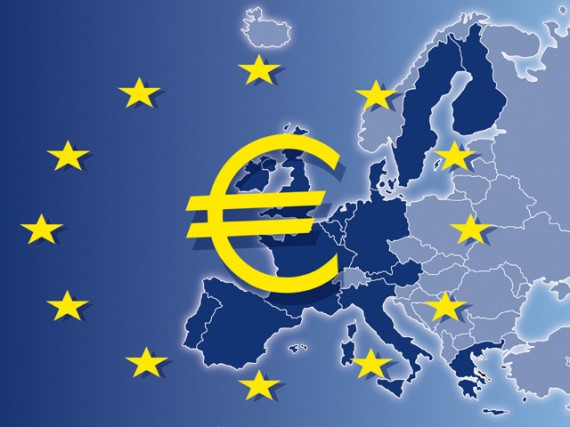Euro Zone Jobless Rate Remains At 12.5%, Solutions Seem Out Of Reach
The economy of the Euro Zone remains in quiet dire straits, unless you're lucky enough to live in Germany.
While the United States deals with what is, at best, stagnant growth, Europe continues to have it much worse:
FRANKFURT — The economic recovery in the euro zone is feeble. Employment continues to suffer. And the patient is likely to be getting around on crutches for months if not years to come. That was essentially the prognosis from two key economic indicators published Thursday and from economists assessing the latest conditions.
The number of people out of work in the countries using the euro currency rose slightly in September, while inflation fell more than expected — both signs of a weak economy.
Neither indicator necessarily contradicts other more positive economic news recently, notably an end to the recession in Spain. But the data, which showed euro zone unemployment stuck at a record high of 12.2 percent and inflation at its lowest level in four years, served as a reminder that a long convalescence lies ahead for Europe.
“It doesn’t mean we’re back in recession,” Marie Diron, an economist who advises the consulting firm Ernst & Young, said of the jobs number. “It’s consistent with growth, but weak growth.”
The unemployment rate is an especially critical economic indicator in Europe. Years of austerity and joblessness have fed radical political parties and strained democracy throughout the euro zone. The longer that record unemployment persists, the harder it will be for political leaders to contain discontent and push through changes in labor regulations and other rules that are needed for the region to grow more strongly.
“This is a race against time,” said Nicholas Spiro, managing director of Spiro Sovereign Strategy in London, a consultancy. “Can these economies recover fast enough before an anti-Europe backlash brings down the single currency project?”
The jobs and inflation numbers, reported Thursday by Eurostat, the European Union statistics agency in Luxembourg, could have a sobering effect on investors who have been bullish on Europe lately. Germany’s benchmark DAX index, which has risen 24 percent in the last year, was little changed Thursday. The euro, which was at a two-year high against the dollar at the beginning of the week, fell more than a cent to $1.36.
The jobless rate was the same as August’s, which was revised up to 12.2 percent from 12 percent. But the absolute number of jobless people in the 17 countries in the euro area rose by 60,000 to a total of about 19.5 million, according to Eurostat.
Not surprisingly, there is much variation between nations:
There remains a huge gulf between economic performance in Austria and Germany, which had the lowest unemployment rates, and Greece and Spain, which had the highest.
Unemployment in Austria was unchanged at 4.9 percent in September, and in Germany the rate fell to 5.2 percent from 5.3 percent.
The jobless rate in Greece was 27.6 percent in July — the most recent month reported by that country’s statisticians — up from 27.5 percent in June, Thursday’s data showed. In Spain, the unemployment rate was unchanged in September at 26.6 percent. In both countries, unemployment among younger people is well above 50 percent.
Argyro Athanassiou, 24, has struggled to find steady work since she graduated from Athens University with a degree in economics more than two years ago. “I did some baby-sitting for some friends of my parents who felt sorry for me,” she said Thursday in a cafe near central Athens. “I have a box full of job applications that went nowhere. I look at it and wonder what I might have been if this crisis hadn’t happened.”
Thanassis Stamatopoulos, 46, said he had been looking for work since the spring of last year when he was laid off from his job as a salesman for an electronics products retailer. “Firms are getting rid of people; no one’s hiring,” said Mr. Stamatopoulos, who added that he had asked his local bakery for work last week but was rejected.
Joblessness also continued to rise in France and Italy, which have the second- and third-largest economies in the euro zone, after Germany. Unemployment in France rose to 11.1 percent in September from 11 percent in August, while in Italy the rate increased to 12.5 percent from 12.4 percent.
“Italy is the sick man of Europe; France is a close second,” Mr. Spiro said, adding that he remains deeply pessimistic about the chances for recovery.
The fact that Germany and Austria are relatively prospering while other nations remains mired in the stagnant economies that have marked them since long before the 2008 financial crisis is a stark reminder of just how un-united the Euro Zone actually is. The economic policies that Greece, Spain, Italy, and France have pursued for the better part of a decade stand in marked contrast to those that Germany has pursued (I’ll admit to not being very familiar with Austrian economic policies but one presumes that they benefit greatly from their close proximity to Germany.) Add to that the fact that each of those four nations have pursued a social welfare system that has contributed to huge amounts of government debt, led to tax increases that have most likely chased away industry, and created a generation of young people who are chronically unemployed and the source of the problems become rather obvious.
The question is what can be done to solve those problems. After five years of trying, there don’t seem to be very many options left.







Let’s hear it for AUSTERITY IN THE FACE OF RECESSION!!!!
Whoot-whoot!!!
This is the new normal. It’s not just outsourcing but we need fewer and fewer people to make things as industrial robots do it instead.
What if the Eurozone was forced to one common monetary policy, one that benefited Germany and Austria, while hindering others?
Wouldn’t that make the “social programs” story less impressive?
Having one currency for Germany and Greece could actually do that.
And actually, while you frame Germany and Austria as the non-players in social welfare systems, aren’t they actually way more so than the US?
Even with their success and low rates of unemployment?
(Basically C- in comparative economics. You found “factors,” but ones ideal for your confirmation bias, rather than significant discriminators – especially when the “missing data” is added back, to place Germany and Austria in their proper position with respect to social welfare)
The welfare state and social expenditure (% of GDP, nmost recent) by country
[spoiler: Germany has higher social spending as a percentage of GDP than Greece]
Germany has some of the most generous social benefits in the world, including health insurance, retirement, and mandatory 4 week vacation.
Germany and Austria have, like most northern European nations, a very generous social welfare system. According to OECD, public social expenditures amount to nearly 30% of GDP.
Germany, and likely Austria, due to their shared Germanic culture, have very high savings rates. People are not into conspicuous consumption, with perhaps the exception of cars. Their banks are very conservative and don’t take a lot of risks.
Er, Doug, you may not have read of these options in Reason.org, Café Hayek, or wherever you get your economics, but there is one option that has been known to work-Keynesian stimulus. You might want to read up on it. Try “End This Depression Now” by your and my favorite economist, Paul Krugman. Blurb:
There certainly are options left. Any competent Keynesian could spell out a plan, and probably has.
The Euro-zone lacks the massive wealth distribution system that exist between US states.
@gVOR08:
Any Keynsian with his own currency.
Devaluation wouldn’t hurt either.
Wow, you all are just clearly part of a large segment of the OTB commentariat who gets upset when Doug refuses to parrot that days Democratic talking points! You big jerks!
@john personna:
“Any Keynsian with his own currency.”
The Euro isn’t a the currency of the EU? Who knew?
@john personna:
So the conclusion could be that Germans make better socialist that Greeks. The question for the U.S. though is how will the different demographics groups inside the U.S. would respond to massive social welfare spending.
Also, as has been pointed out before about the graphic for this article – that is not a map of the Eurozone. It is a map of the European Union as it is existed between 1995 and mid-2004.
@DC Loser:
What most Americans refuse to acknowledge about Germany is that those very generous welfare benefits are paid for with high taxes. Thus Germans are faced with the decision of either having children and lowering their standard of living or not having children. A large portion of the population in Germany have decided to not have children. http://www.nytimes.com/2013/08/14/world/europe/germany-fights-population-drop.html
The real question for the future of Germany is who will be around in the future to pay all of the taxes required to fund the social welfare state.
It merely proves that Socialism, even when evenly applied, skews results much more than capitalism does. At least we have equal opportunity, which includes the right to go broke.
@john425:
You do know that the American Dream is dead? That Australia, Sweden, Norway, Finland, Germany, Spain, France, and Canada all have more intergenerational mobility than the US? There’s no equal opportunity…
Super Dooper….
Are you talking about Ted Cruzes $14,000 health care subsidy?
All those unemployment numbers “prove” is what a great deal the Euro was for Germany, and what a horrible tragedy it was for the PIGS (Portugal, Italy, Greece and Spain).
If Greece was still on the Drachma, they would have simply devalued, suffered through a little inflation, then traded their way out of recession (not the depression they suffered instead). With a Euro that Germany essentially controls, they really have no cards to play.
The historical solution to both the recent Greek economics grad who can’t find a job and the German birth rate decline is the same — emigration from places with no jobs to places with jobs. In the 19th and early 20th centuries, the US was the beneficiary of that influx of talent, especially skilled Jewish professionals.
12.5%? And we are what, at 7.2% while shrinking government?
Sounds like Obama is doing a reasonably good job…
Yes, that would explain the rapid flow of wealth to the top in America in the 21st century.
@superdestroyer:
Isn’t that the case even if there were no taxes?
In thinking about Europe in the days following WWII, just what lesson can we learn from that when you connect it to conditions today?
@superdestroyer:
Everyone, everywhere is faced with lower standards of living when they have kids. Kids are expensive. You need a bigger house, bigger cars, money, money, money.
If only there were a real world example that the Reinhart and Rogoff austerity plan was wrong. Maybe it wasn’t enough to have their entire study disproved based on horrible math and mistakes in their statistical analysis. Because austerity made a hell of a talking point about the uncontrollable social welfare crippling our country in the wake of record low taxes and insane corporate profits. But I mean it has to be the correct solution because all of these socialist states that were doing so bad before austerity are doing so much better now. Because in the end we know governments can’t create jobs and tightening the national belt does nothing but spur private sector growth. Let Europe be proof that AUSTERITY ECONOMICS is the path America should be on, because God help us if we end up like Europe by not pursuing austerity in the face of recession.
@michael reynolds:
But if one is paying very high marginal tax rates, the percentage of your take home pay that one has to commit to children (especially in a high regulatory country) has a greater impact on behavior than in lower marginal tax areas.
Also, if the percentage of residents in Germany who were born elsewhere goes high enough, what happens to the culture of Germany. Will a very expensive social democracy function when a significant portion of the population is not from that culture.
@superdestroyer:
Bless your heart, you think immigration in Germany works just like it does here.
@Moosebreath:
It is a EU currency, and not a Greek currency.
That means you can’t devalue Greece with respect to Germany. You can’t encourage Greek exports to Germany on that basis, or lure more German tourists that way.
@superdestroyer:
The Germans beat us on a number of statistical measures, don’t they?
MEASURING AMERICA’S DECLINE, IN THREE CHARTS
The real question is why we refuse to look at successful strategies, used elsewhere.
@superdestroyer:
Oh, the liberals know that, and are open to that.
The real dysfunction lies on the populist-right, where people use “‘leading us to European-style socialism” as a bogeyman.
Never mind that we are actually doing worse on many measures than those scary Europeans.
@john personna:
In my experience, very few of them actually know what “European-style socialism” is, and isn’t.
@Mikey:
I don’t know …
Charles Krauthammer / The choice: European-style socialism or historical parenthesis?
Many have repeated that story, whether they understand it or not. Obama is “the anti-Reagan” taking us all to “European-style socialism.”
The beatings will continue until morale improves.
@superdestroyer:
Please cite your source.
@Mikey:
According to http://en.wikipedia.org/wiki/Turks_in_Germany#Segregation
So what happens when the people in Germany who are actually having children keep themselves segregated from the rest of the country. Will have a high spending social democracy still work or will corruption increase and the positive effect of social welfare spending decrease.
Germany currently spends much more than the U.S. while having a lower level of personal dysfunction. Image what would happen to the U.S. if it tried to have the social spending levels of Germany.
@superdestroyer:
We would have less personal dysfunction?
Such a depressing and predictable post and thread…Doug gets it totally wrong again about government stimulus…I notice he can’t even mount a retort to being proven disastrously wrong…and then Superdestroyer comes along with his typical stock implication that more ethnic diversity supposedly leads to the decline of countries…he brings everything but the white bed sheet…
@superdestroyer: Oh, a Wiki article, cool. I guess my seven years living in Germany and being married to a German are pretty meaningless compared to that.
When one understands traditional German attitudes toward Auslaender, one will understand how well the Turkish population has assimilated.